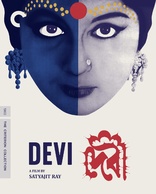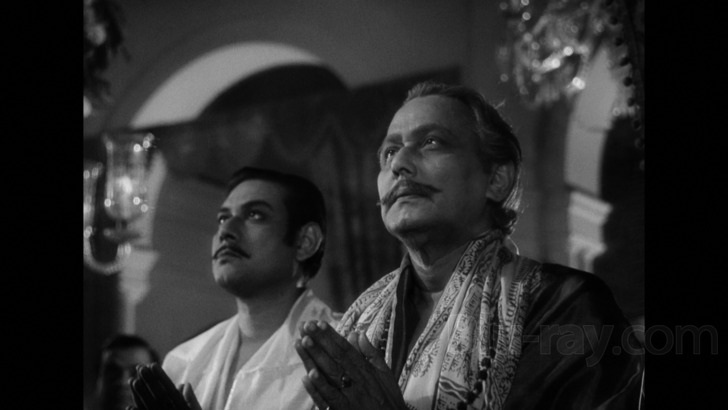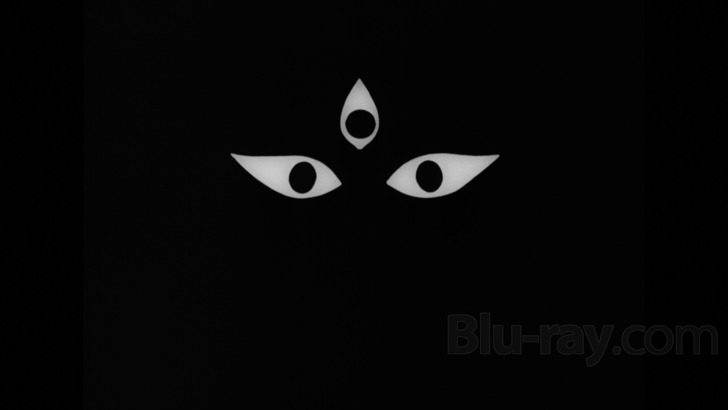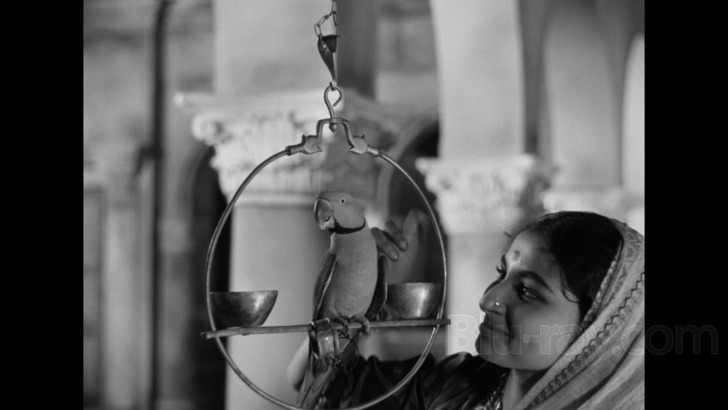Devi Blu-ray Movie
HomeDevi Blu-ray Movie 
The GoddessCriterion | 1960 | 93 min | Not rated | Oct 26, 2021

Movie rating
7.2 | / 10 |
Blu-ray rating
| Users | 4.5 | |
| Reviewer | 4.5 | |
| Overall | 4.5 |
Overview
Devi (1960)
A young woman's father-in-law begins to believe that she is a reincarnation of the goddess Kali, to whom he is strongly devoted. As she falls under the adoring eyes of other villagers, she begins to lose herself to the illusion.
Starring: Sharmila Tagore, Soumitra Chatterjee, Chhabi Biswas, Karuna BannerjeeDirector: Satyajit Ray
| Foreign | Uncertain |
| Drama | Uncertain |
Specifications
Video
Video codec: MPEG-4 AVC
Video resolution: 1080p
Aspect ratio: 1.37:1
Original aspect ratio: 1.37:1
Audio
Bengali: LPCM Mono (48kHz, 24-bit)
Subtitles
English
Discs
Blu-ray Disc
Single disc (1 BD)
Playback
Region A (locked)
Review
Rating summary
| Movie | 4.5 | |
| Video | 4.0 | |
| Audio | 4.0 | |
| Extras | 3.0 | |
| Overall | 4.5 |
Devi Blu-ray Movie Review
Father-in-law knows best.
Reviewed by Jeffrey Kauffman November 15, 2021Religious belief can be either a bulwark or a burden, depending on one's point of view, and both of those disparate aspects are on full display in about equal measure in Satyajit Ray's devastating 1960 film Devi. The term "devi" means "goddess" in Sanskrit (I haven't researched, but I have a feeling that courtesy of Proto- Indo-European, it's probably a cognate of words like "divine" and/or "divinity"), and the film details the rather peculiar story of a young woman in a rural Indian community in the 19th century who has both the honor and misfortune to be perceived as an incarnation of Kali.

Satyajit Ray was Indian "royalty" in a way, and his films have often been held up as paradigmatic examples of depictions of India and Indian culture. In that regard, it's probably salient to note a rather interesting quote from Ray himself which is included in the supplement entitled A Goddess in Close-up, featured on this disc:
The western critic who hopes to do full justice to Devi must be prepared to do a great deal of homework before he confronts the film. He must read up on the cult of the Mother Goddess, on the nineteenth century renaissance in Bengal and how it affected the values of orthodox Hindu society. . .on the position of the Hindu bride in an upper class family, and on the relationship between father and son in the same family.Now, I am one who typically shirks "homework", but Devi is so clear in its portrayal of family relationships that even an "outsider" can probably instantly glean what's going on. The film begins with a 19th century Bengali religious festival which introduces paterfamilias Kalikinkar Choudhuri (Chhabi Biswas) and one of his sons, Umaprasad (Soumitra Chatterjee), in celebratory worship. This first scene firmly ensconces the family in both a community of believers as well as in a hierarchal patriarchy where Kalikinkar's word (and/or belief, as the case may be) is law. Umaprasad is married to Doyamoyee (Sharmila Tagore), but the couple is soon to be separated, since Umaprasad has plans to travel to Calcutta to better his English and teach.
There's already some subtext between Kalikinkar and Dayamoyee which is detailed a bit in the A Goddess in Close-up featurette, but which reaches troubling heights when Kalikinkar has an overwhelmingly visceral dream which seems to "suggest" to the elder that his daughter-in- law is a holy avatar. Kalikinkar more or less simply then announces the fact that Doyamoyee is an incarnation of the goddess Kali, and his eldest son Taraprasad (Purnendu Mukherjee) pretty much just falls in line. Doyamoyee, perhaps feeling incapable of arguing, doesn't do a bunch of protesting herself, but rather interestingly Kalikinkar's wife Harasundari (Karuna Banerjee) is having none of it. By the time an incredulous Umaprasad returns to check out what's going on, the complete family dynamic is roiling, especially since what may or may not be "only" a coincidence has left many of the local townspeople also believing in Doyamoyee's presumed divinity.
It's a sadly verifiable fact that any kind of religious belief taken to extreme levels and detached from any connection to rational thought can often lead to tragedy, and so there is an ineluctable sense that things are cartwheeling toward just such a conclusion in Devi. This seemingly unavoidable march toward sadness actually ends up involving another family relationship which won't be detailed in this review, other than to say it delivers an emotional punch of some force when it arrives. As the A Goddess in Close-up featurette also details, there's perhaps just a bit of "artistic license" that Ray employs in the film's closing images, which may do a bit of dreamlike "suggesting" on their own, without ever overtly detailing what is going to befall Doyamoyee after things fall apart.
Devi Blu-ray Movie, Video Quality 

Devi is presented on Blu-ray courtesy of The Criterion Collection with an AVC encoded 1080p transfer in 1.37:1. Criterion's accordion style foldout offers the following information about the restoration:
Devi is presented in its original aspect ratio of 1.37:1. This new 4K digital restoration was undertaken by the Criterion Collection in collaboration with L'Immagine Ritrovata in Bologna, Italy. The 35 mm original camera negative was burned in a fire during transport from India to the Academy Film Archive in Hollywood in 1993. Only reels two and twelve, preserved by the Academy and amounting to a total of sixteen minutes, were salvageable for use in this restoration. The remainder of the film was completed using the only other known and accessible high quality material: a third generation 35 mm duplicate negative preserved by the Harvard Film Archive. Additionally, a 35 mm print preserved by the Academy was used for the main title sequence. All film elements were scanned in a Lasergraphics Director film scanner at Roundabout Entertainment in Burbank, California.Considering the information imparted above (and there are actually copious online articles about the horrifying destruction of any number of negatives of Ray's films in a fire), the results here are extremely commendable, though there are probably wider variances in image quality on display than regular fans of Criterion fare may be used to seeing. Particularly problematic are the many optical dissolves in the film, where already recurrent if relatively minor signs of age related wear and tear can spike pretty dramatically, with lots of scratches, dirt and slight image instability through the dissolves. Some, as in a brief shot of "pilgrims" late in the film, have kind of peculiar anomalies where almost look like tubes of light running vertically above the people accompany their travels. Those passing issues aside, this transfer boasts really solid contrast and some impressively deep blacks, with often lustrous modulation of gray scale. Fine detail is appealing, and Ray utilizes close-ups repeatedly, which help to elevate detail levels even more. No doubt due to the various source elements which had to be utilized, there are some clear variances in image quality, and some moments can look more like "dupes" than others, notably an outdoor scene at night where some crush intrudes and grain is bit chunkier than the rest of the presentation.
The original monaural soundtrack was remasterd from the Academy's 35 mm print and from three reels salvaged from the burned 35 mm optical soundtrack negative.
Devi Blu-ray Movie, Audio Quality 

Devi features an LPCM Mono track in the original Bengali which may be a bit shallow sounding at times, but which does not have any real issues like can be spotted on the video side of things. Ustad Ali Akbar Khan contributes a gorgeous "ethnic" score which is extremely colorful (the Goddess featurette suggests Ray adapted some folk music to his own needs for the film as well). Dialogue is rendered cleanly and clearly throughout, and I noticed no issues whatsoever in terms of damage, dropouts or distortion.
Devi Blu-ray Movie, Special Features and Extras 

- Sharmila Tagore and Soumitra Chatterjee (HD; 16:20) offers 2013 interviews with the actors.
- A Goddess in Close-up: Satyijat Ray's Devi (HD; 17:19) is a really interesting video essay by Meheli Sen which details some of the subtext of the film which may be less familiar to Western audiences.
Devi Blu-ray Movie, Overall Score and Recommendation 

Devi may in fact be an intrinsically "Indian" story, as evidenced by Ray's warnings to those pesky "Western critics" above, but it is also a universal cautionary tale that any form of over zealous belief can lead to tragedy. This is a film marked by Ray's always visceral visual sense, but elevated by some really remarkable performances. Video encounters a few hurdles due to the condition of the elements that had to be utilized, but audio is fine, and the two supplements very enjoyable. Highly recommended.
Similar titles
Similar titles you might also like

Diary of a Country Priest
Journal d'un curé de campagne
1951

The Cloud-Capped Star
মেঘে ঢাকা তারা / Meghe Dhaka Tara
1960

The Flavor of Green Tea over Rice
お茶漬の味 / Ochazuke no aji / includes "What Did the Lady Forget?" (1937)
1952

Maborosi
幻の光 / Maboroshi no hikari
1995

The Hero
নায়ক / Nayak: The Hero
1966

The Third Wife
Người vợ ba / Slipcover in Original Pressing
2018

India Song
1975

Cemetery of Splendor
2015

Early Summer
麥秋
1951

An Autumn Afternoon
秋刀魚の味 / Sanma no aji
1962

A Ship to India
Skepp till Indialand / A Ship Bound for India
1947

The Big City
মহানগর / Mahanagar
1963

Mustang
2015

Late Spring
晩春 | 4K Restoration
1949

Pather Panchali 4K
পথের পাঁচালী / Song of the Little Road
1955

Aparajito 4K
অপরাজিত / The Unvanquished
1956

Dekalog
The Decalogue
1988

Apur Sansar 4K
অপুর সংসার / The World of Apu
1959

Beanpole
Дылда / Dylda
2019

Kill 4K
2023